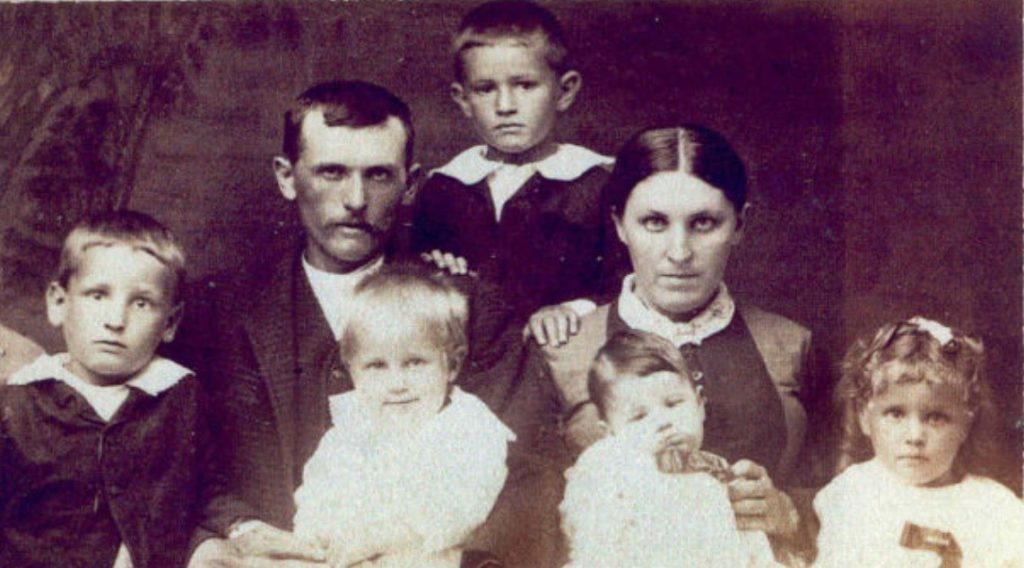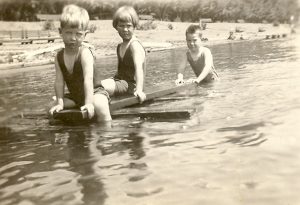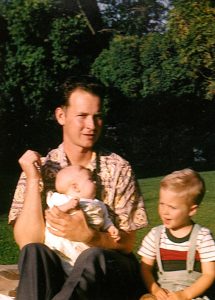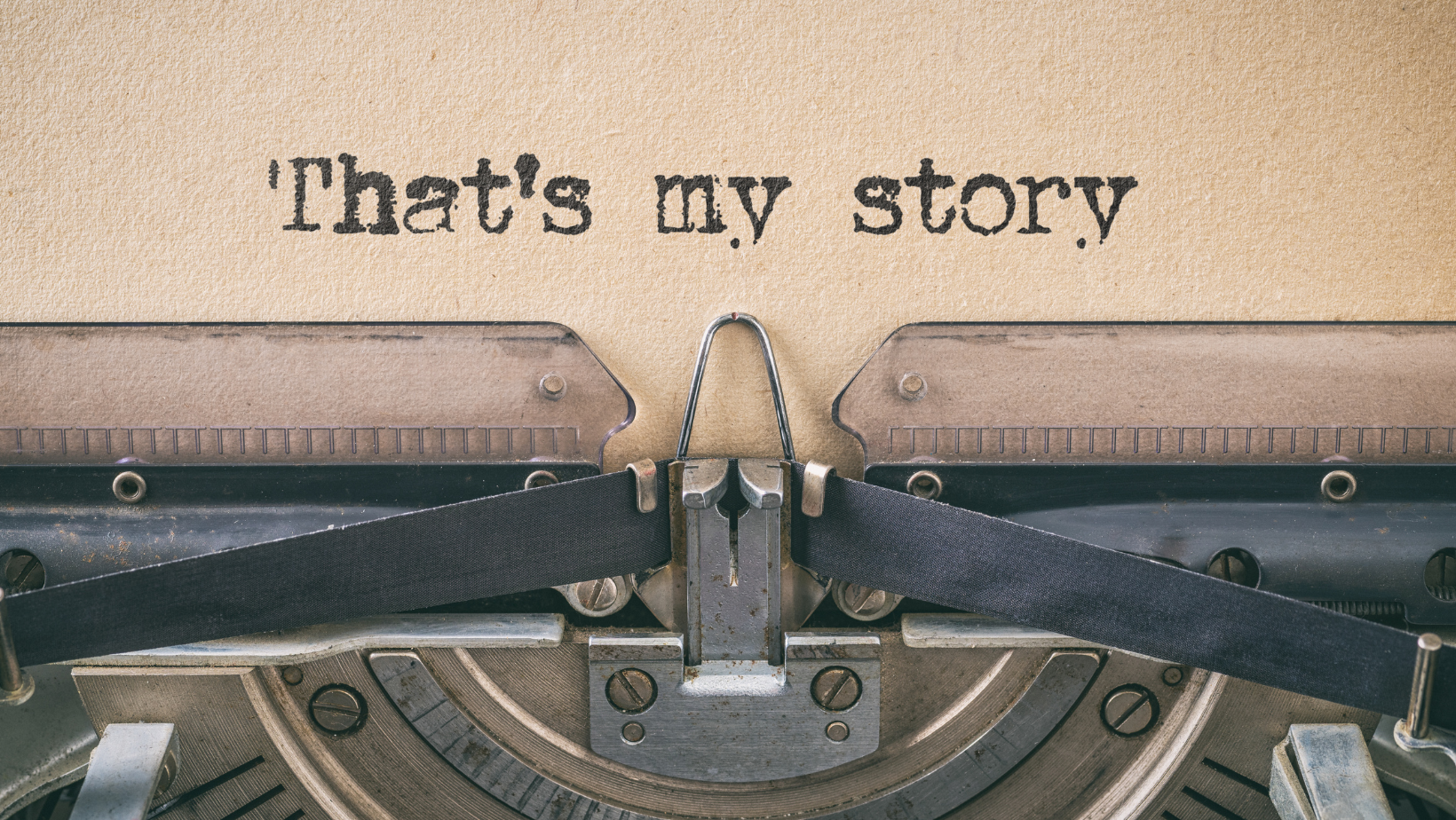Why does it make sense for you to write about your own life? It’s one way to create a legacy that future generations will value. If writing for young children, it’s a way to make sure they know you, no matter what happens. Life can be uncertain. Let me show you what I mean with two stories about people who are no longer alive, two people whose stories I wish they had written down. I hope you see that capturing what your life is like, what you’re like, what you feel about the people around you, and how you spend your time, is a gift to others, no matter how mundane it seems to you. It will also give you story seeds for other kinds of writing that you want to do.
Reaching Across Generations
At my age, I can be a bridge that crosses nearly 200 years in a family’s history. Let me illustrate with what I know about my mother’s grandmother, Mary Ambrose Callen, who was born in 1866, just two years after the end of the Civil War. I’m sure if asked she would have said, “I’m just living an ordinary life.” See what you think.
A Life Sketch
When Mary Elizabeth Ambrose was born on 6 June 1866, in Island Creek, Pike, Kentucky, United States, her father, Francis Marion Ambrose, was 22 and her mother, Louisa Mariah “Chris” Minter, was 25. She married Buenos Ayres Callen on 20 August 1881, in Denver, Carroll, Arkansas. They were the parents of at least 10 sons and 2 daughters. She died on 8 March 1957, in Jerome, Jerome, Idaho, United States, at the age of 90, and was buried in Jerome, Jerome, Idaho. (Brief bio from Ancestry.com)
Now you know that Mary Ambrose was 15 when she married. Mary had 12 children that lived to grow up. She has had hundreds of descendants. When her youngest child was living with one of his older brothers, she kicked her husband out of the house, tired of dealing with a mean drunk. She divorced him, not a common action in the 1920s for anyone, much less a mother of 12. When he was injured in a car accident, she took him back in, nursed him back to health, and kicked him out again.

Day-to-Day Things I Wish I Knew
I have wondered what her day-to-day life was like back in the early days when she had such a houseful of people and kept having more children. Here are some of the things I wonder about:
- How did she manage children? Did she ever play with them, or was she just too busy?
- How did she keep up with laundry, back when there was no electricity in the home and therefore no washing machines? I often think of all the dirty socks that she made clean. Out of the 12 children, only 2 were girls, and the older daughter ran off and got married at 16. My great grandmother didn’t get much sock-washing help from her offspring.
- Did she like to garden? Just vegetables, or did she also plant flowers?
- How did she support herself as a divorcee in the 1920s?
- What did she do for fun, or was that a foreign concept?
Big Picture Questions
Here are questions about her whole life.
- She had her first child in 1882 when she was 16 and her last in 1909 when she was 43. Was there a big difference in the way she raised them?
- How did she feel about her husband, from the early days to the divorce to the end?
- Did she want to have so many children, or would she have been relieved to have birth control?
- Was my great grandfather violent to her or their children? I don’t know entirely what “mean drunk” meant to her.
- What kind of relationships did she have with her grandchildren? My mother felt she was her grandmother’s favorite. Did others feel the same way?
- Why was she a lifelong Republican? There’s a story of my grandfather finding her weeping. When asked, she replied, “Tommy voted for a Democrat!” Thomas was her third youngest child.
While I never knew her personally, I heard enough stories to make me curious. If I tell those stories to my grandchildren, it’s not implausible that there may be memories of her that still exist in 2066. If I had something she had written down, preserving her memory would be easier to do without me embroidering the truth with my ideas.
The moral to this story is that it is never too late as long as memory exists, but it would be even better if she had told her own story.
Being Present for Your Children
I have no direct memories of my father, Louis Herbert Sugg, none at all. I was 21 months old when he left on his last tour of duty, test piloting jets off the Coral Sea aircraft carrier in the Mediterranean Sea.
What I Do Know About My Father
To have your hair stand on end, watch this Youtube video about Naval carrier operations in 1951. Jets were catapulted from a carrier, accelerating from 0 to 200 mph in 2 seconds. They landed by catching a hook on a cable, all the while accelerating so they could take off again if the hook didn’t catch.
My father loved flying. He told his sister once that he felt like he was in the arms of God. Not many years ago, it occurred to me that I could actually be angry at him for choosing such a dangerous career, given the three small children at home. I have a friend, Lee K Bohlen, who has been writing a book about a childhood spent with her father on long tours of duty on nuclear subs. The family had no idea where he was in the world when he was away. We both agree that a big price is paid by the children of the brave people who serve in our armed forces. We children deserve some of the gratitude people extend to the military.
Paying the Price
September 1953, Louis flew a test flight in formation off his aircraft carrier. The last instruction to the squadron was to climb to a certain altitude as quickly as possible. Lou got to the specified height first, and his last words went over the radio, “Skipper, I bet you wish you had my plane.” Then his plane spiraled out of control and was lost in the waters of the Mediterranean. There was no definitive answer about what happened, but the general sense was that he ran out of oxygen, blacked out, and lost control of the plane. I guess that’s useful information to gather from a test flight.
When the word of his death reached my mother back in Norfolk Virginia, she had three small children, ages 5, 2, and 1.
Finding Out About My Father
Having absolutely no memories of him, I have always wanted to know more about what he was like. Learning about him has been a challenge.
I asked my mother, but she never was good at telling stories that made him come alive. Her main word for him was “gay,” meaning lighthearted. He apparently liked to gamble; whenever he won anything, he gave her a gift to soften her disapproval. I share her pride that he applied once for a Rhodes scholarship, and when he was turned down, applied again successfully. They spent a wonderful time together in Oxford England from 1949 to 1952, making many trips on the war-ravaged continent. I was born in Oxford. When my mother remarried, she burned all of her letters from Lou. That I consider almost a crime.

I asked my father’s older brother for stories. He spent a lot of effort writing down his memories. The story that stuck with me the most clearly was the time my father fell in an irrigation ditch full of fast running water. He was 4 years old and not yet a strong swimmer. Fortunately, his coat bloused up and served as a flotation device until his 6-year-old sister and 7-year-old brother could run down along the bank and pull him out. I had a narrow shave there of never coming into being. It’s a remarkable statement about the times that the 7-year-old was responsible for watching the 4-year-old.
Other people who knew him made very general comments, and their stories related to going to baseball games or what fun it was to travel around Europe with him.
Years later, I asked Chris Peterson, a psychologist who performed content analysis of writing by medal of honor winners, to look at my father’s successful Rhodes application essay. For more about that, I invite you to read Remembering the Extraordinary Life of an Ordinary Person.

What I Still Wish I Knew About My Father
Finally, I realized that what I most wanted to know was what he thought and felt about me. I have one little snippet from a postscript in a letter to his mother when he mentioned me by name. That’s it. No other mention that I existed or what I meant to him.
Even worse, I never even had a picture of him with me until I was more than 50 years old. My mother found a picture in a box of old slides. I keep a print of it in my office and look at it often. Aha! There I am, probably about 3 months old, clutching his thumb. He was in my life!
The moral to this story is something I told a friend dying of leukemia. He asked me what he could do for his small child’s future well-being. I told him to leave behind evidence that he loved his child. He could write letters, take pictures, make videos. How I wish my father had left behind anything to give me the sense of who he was, what was important to him, and in particular, what he felt about me as his child.
This may see unnecessary to healthy young parents who expect to be there until their children grow up. But there’s no guarantee that will happen. I expect my father expected to come home to us.
Conclusion
The mundane of today becomes exotic tomorrow, given all the changes in life style that occur with advances in technology. For example, I have had people ask me to write about what computer science was like when I started in 1972. Whatever you capture about your life right now is likely to interest somebody, if only just your children, your grandchildren, your nephews, nieces, and cousins.
Conveying love across generations can make a tremendous difference. My mother used to ask why it mattered so much to me, given that I’d had her to provide stability and love. I don’t know why, but it did.
Even if you have nobody else in mind who will read your mini-history, your future self may find it fascinating.
Forget about feeling mundane while you take a snapshot of where you are.

